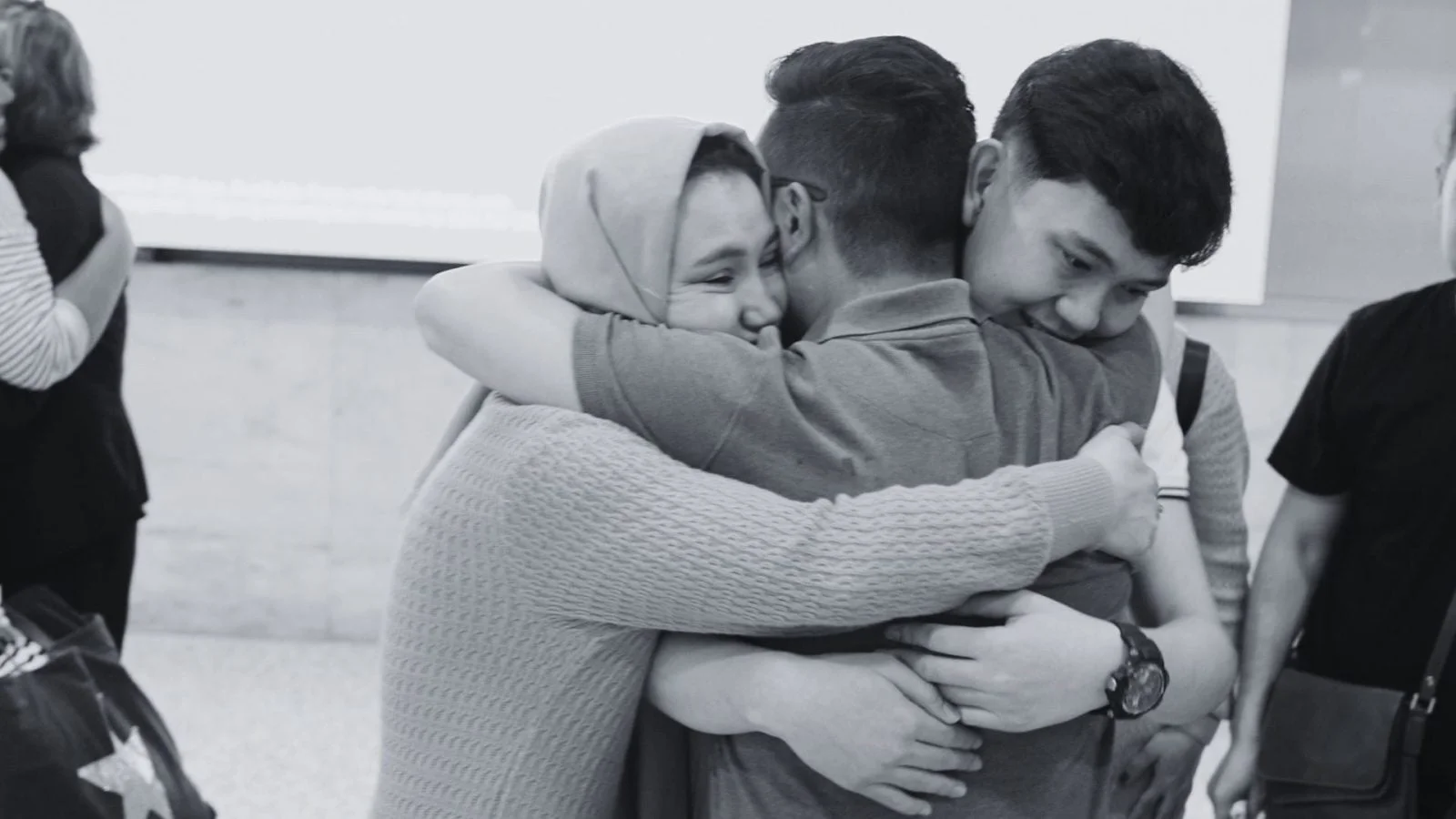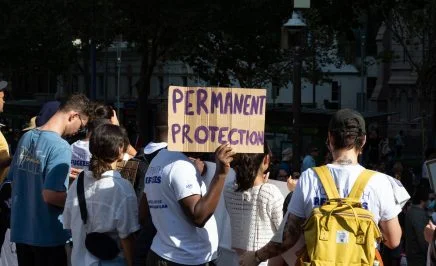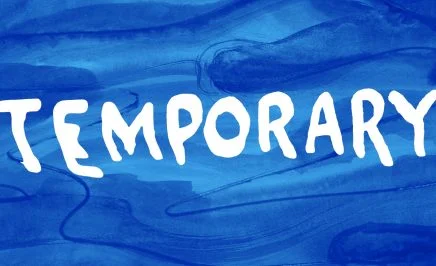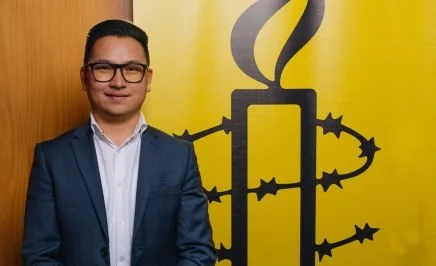Zaki Haidari fled his home in Afghanistan in 2011, after his family was accused of helping foreign forces by the Taliban. Facing death threats, he left his family behind and became a refugee.
After a long and dangerous journey looking for a safe country to call home, he finally made it to Australia; but he was not welcomed. Australia’s cruel refugee policy meant that for years he lived in limbo. Unable to become a permanent resident, living on temporary visas, he was unable to bring his family to Australia with him.
After 10 years of tireless campaigning alongside Amnesty International, Zaki helped to abolish the temporary visas that held him back. Most importantly, now that he is living as a permanent resident, he was able to bring his family to safety.
This is Zaki’s story.
Refugee reunited with family after 10 years — Zaki’s story
On a bitterly cold day in Hobart 10 years ago, I sat opposite an Immigration Department official who told me: “Don’t be happy that you are living in the Australian community. This bridging visa only means you can stay in Australia temporarily.” I was warned the government was working to build capacity in offshore detention centres and would send us back when they had more room available.
I was shocked then, and I am still shocked today at the cruelty of those words, driven by immigration policies that continue to harm people who seek refuge in Australia by sea. I was only 17 and told I would never call Australia home.
It was the first of many experiences I had with the brutality and intransigence of Australia’s immigration bureaucracy serving politically driven deterrent policies in breach of the Refugee Convention. It is still unbelievable to me that Australia is a signatory to the 1951 convention yet for years now it has failed its obligations to offer equal protection to people seeking refuge from persecution who arrive by sea.
Since 2013 when the Australian government introduced Operation Sovereign Borders, Australia has ignored its obligations, keeping thousands of people in offshore detention who have been granted protection, or keeping them on temporary protection visas in Australia without the right to study, travel or reunite with family and loved ones.
Many asylum seekers still waiting for a decision to be made, whose applications have been delayed or are held up in long appeal processes, continue to suffer life in limbo on bridging visas with even fewer rights. Some people don’t even have the right to work and are forced to go to community centres for food and support.
The recent announcement of a pathway to permanency for 19,000 people like me – who came to Australia by sea, sought asylum, were granted protection in Australia but were kept on temporary protection visas and safe haven enterprise visas – is an important victory on the way to justice for all refugees and asylum seekers.
It’s hard to accept that the cruelty is over for some people, because we have been fighting for so long. But we must not forget that there are still more than 11,000 people left out of this decision, living in limbo without their basic human rights.
How did this happen?
Having fled Afghanistan, I arrived in Australia before July 19, 2013, when the policy relating to people who arrived by sea changed. An unfair and totally arbitrary distinction is being made between someone who arrived in Australia before July 19, 2013, who can now be granted permanent protection, and someone who arrived after that date.
For those arriving after that date, things got much worse when Australia began taking people who arrived by sea offshore to Nauru and Manus Island, including families, telling them they would never ever be allowed to settle in Australia.
The brutality of that policy, which continues today, has split up families and ruined lives. I know families who, because of the complexities and risks associated with fleeing persecution, arrived at different times. One father I know hasn’t seen his children for years because he was taken to Nauru, while his wife and children who arrived in 2012 stayed in Australia on a temporary protection visa. The father has been told he will never call Australia home and his only option is to resettle in New Zealand without his family.
The unfairness and cruelty of these decisions and policies is inexplicable to me.
One of the reasons so many people are still on bridging visas awaiting decisions from the government on whether they will be granted protection in Australia is because of the serious flaws of the Abbott government’s so-called fast-track process, when temporary protection visas and safe haven enterprise visas were first introduced. This process pushed people into rushing their applications and then put limits on what they could submit on appeal.
I was shocked … at the cruelty of those words, driven by immigration policies that continue to harm people who seek refuge in Australia by sea.
There were limited legal services at the time, forcing people to engage unqualified agents, which has further contributed to long appeal processes. In the meantime, people cannot move on with their lives even though, in some cases, children have gone to school, graduated and yet are forbidden to study once they turn 18.
Others have established businesses and employ people but cannot apply for a loan. And there is the heartbreak of not being able to visit families or loved ones and being unable to bring family to Australia.
And every day it is painful to see people who sought asylum around the time I did who are still suffering on Nauru or in Papua New Guinea after 10 years. They are stuck in a horrible situation because of a deterrent policy and system that is torturing them based on how they arrived.
There are people who lost hope and ended their lives. Where is Australia’s humanity? The Labor government redesignated Nauru as a place for offshore processing only last month, when people are clearly in need of care. There are only about 60 people left on Nauru and 90 in PNG. People have been brought to the brink of despair. Only last week two refugees took extreme action, sewing their lips together in protest, and Amnesty International Australia and the UN once again demanded the immediate evacuation of people stuck in these places.
Sadly, there are many others, more than 1000 people, who were forced to live for years in offshore detention on Nauru and in PNG, many of them families, who have been returned to Australia for health reasons. But they are kept in limbo on restrictive bridging visas or in community detention, still told they will never be able to settle in Australia despite being found to be refugees.
Some of the young children detained on Nauru are now young adults who have dreams and want to move on with their lives. Some have finished high school in Australia, but they’re not allowed to go to university. Others in community detention cannot even work.
We all crave safety and a future. At the very least, Australia must allow everyone already found to be owed protection under the Refugee Convention a permanent home in Australia, no matter how or when they arrived.
Australia must stop denying people the right to work and study while they seek asylum and provide timely support for them to find permanent resettlement solutions. And for those left abandoned after years in offshore detention, Australia must immediately close the regional processing centre on Nauru and bring everyone remaining on Nauru and in PNG to Australia, allowing them to live in the community while they receive the medical care they need.
If Australia wants to shape the world for the better it must start at home.
This article was originally published on www.smh.com.au. Zaki Haidari is a refugee campaigner at Amnesty International Australia.




